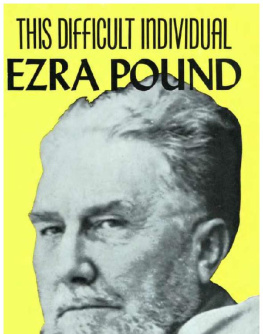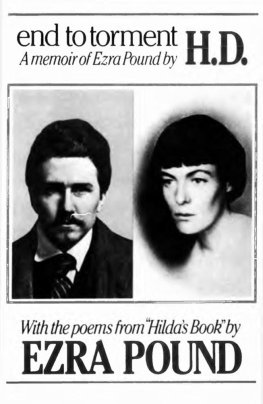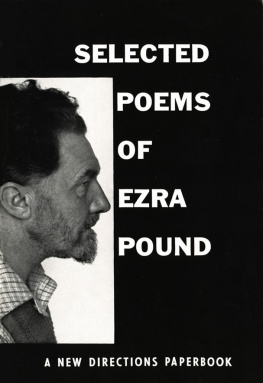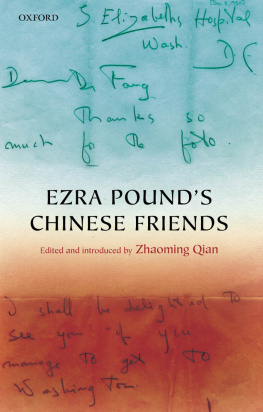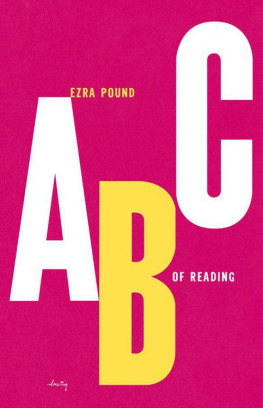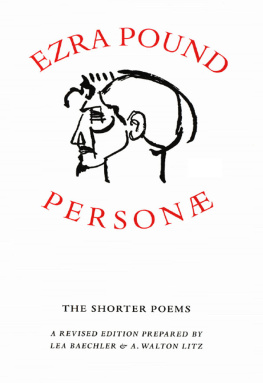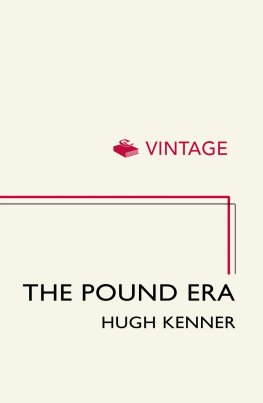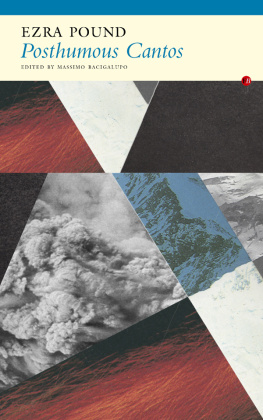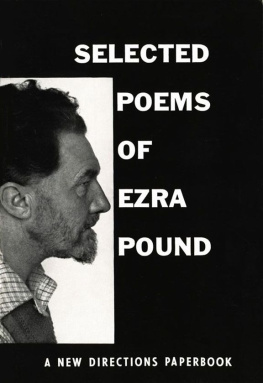FLAPS
THIS DIFFICULT INDIVIDUAL, EZRA POUND
by EUSTACE MULLINS
EZRA POUND is the most controversial literary figure of our timethe same man who edited the work of Yeats and T. S. Eliot, helped introduce the poetry of Robert Frost and influenced the development of Hemingway, was also tried for treason and sent to an insane asylum.
Eustace Mullins for the first time presents the case for Ezra Pound, documenting the tremendous contribution Pound has made to contemporary American culture in a witty and biting criticism of our society, which gives lip service to poetry while imprisoning its major poet.
In an intensely personal, unforgettable portrait of Ezra Pound, Mullins tackles the questions at the heart of the lifetime of controversy and acrimony that has surrounded, encircled, and finally enclosed Ezra Pound. From Mullins vivid writing emerges a portrait of Ezra Pound, as an eccentric genius, a literary leader who is both outrageously outspoken and unquenchably exuberanta man who was kind when he wanted to be, and quarrelsome when his beliefs were questionedthis difficult individual, Ezra Pound.
Mullins has documented Pounds crash into the Victorian literary world of London in the 1920s, his membership in the expatriate Bohemia of Paris; the earlier quiet years in Rapallo and the later tumultuous ones. Included in THIS DIFFICULT INDIVIDUAL, EZRA POUND are excerpts from the controversial broadcasts Pound made from Italy during World War II; the whole record of what happened when Pound, under indictment for treason and committed to an asylum, received the official Bollingen Prize for Poetry from a jury of Americas best-known poets; and the unforgettable record of Pounds incommunicado imprisonment in a roofless iron cage, by the American Army after his surrender in Italy.
From THIS DIFFICULT INDIVIDUAL, EZRA POUND:
Ezra Pound was the only Bohemian of the Second World War. In a world gone mad, he continued to cry out, Stop it! Stop it! He has never raised his hand against another human being.
Pound was duly indicted for treason, but the chief complaint against him seems to have been that he refused to take part in the slaughter. While so many millions were dipping their hands in blood, he asked only for peace.
His purpose was serious, although the result was disastrous for him. The fury against Pound, which is still unabated in many quarters, stems from the fact that he refused to become a barbarian. Almost alone of Western men, he has no blood on his conscience.
ABOUT THE ILLUSTRATIONS:
All the photographs of Pound, his wife and friends, in this book were taken by the author during Pounds imprisonment, and shortly after his release. These are rare portraits of the poet in his later years; the jacket photo, reproduced in the book, is considered by Pound to be the best likeness ever made of him.
COPYRIGHT
COPYRIGHT 1961 by
FLEET PUBLISHING CORPORATION ALL RIGHTS RESERVED
Protected under the International Copyright Convention and the Pan-American Union Convention
The opinions herein expressed do not necessarily represent those of the publishers.
PRINTED IN THE UNITED STATES OF AMERICA
Library of Congress Catalog Card Number: 61-7628
ACKNOWLEDGEMENTS
The author wishes to acknowledge the following for permission to quote excerpts in this biography:
Abelard-Schuman Limited, for excerpts from Intimations by Oliver St. John Gogarty, copyright 1950; Richard Aldington, for excerpts from Life for Lifes Sake; Margaret Anderson, for excerpts from The Little Review and My Thirty Years War; Janice Ford Biala, for excerpts from Thus to Revisit, No Enemy, Return to Yesterday, and New York Essays by Ford Madox Ford; Cassell & Co., for excerpts from The Crowning Privilege by Robert Graves; Christy & Moore, Ltd., for excerpts from J. B. Yeats: Letters to His Son W. B. Yeats; Commentary, for excerpts from Pure Poetry, Impure Politics, and Ezra Pound by Peter Viereck (copyright American Jewish Committee); Constable and Company Limited, for excerpts from South Lodge by Douglas Goldring; Caresse Crosby, for excerpts from Ezra Pounds Imaginary Letters published by the Black Sun Press; Esquire, Inc., for excerpts from Aftermath: The Question of Ezra Pound, February, 1958 issue; Farrar, Straus & Cudahy, Inc., for excerpts from On Poetry and Poets by T. S. Eliot, copyright 1943, 1945, 1951, 1954, 1956, 1957 by T. S. Eliot, and The Apprenticeship of Ernest Hemingway by Charles A. Fenton, copyright 1954 by Charles A. Fenton; Mrs. M. A. Goldring, for excerpts from People and Places by Douglas Goldring; Victor Gollancz, Ltd., for excerpts from W. B. Yeats by Joseph Hone; Har-court, Brace & World, Inc., for excerpts from The Letters of Ezra Pound, 1907-1941 edited by D. D. Paige, copyright, 1950; Gerald W.
Henderson, for excerpts from I Have This To Say by Violet Hunt; Holt, Rinehart and Winston, Inc., for excerpts from Life Is My Song by John Gould Fletcher; Houghton Mifflin Company, for excerpts from Amy Lowell: A Chronicle by S. Foster Damon, and A Critical Fable by Amy Lowell; Mrs. G. A. Wyndham Lewis, for excerpts from Blasting and Bombardiering by Wyndham Lewis; J. B. Lippincott Company, for excerpts from It Was The Nightingale by Ford Madox Ford; The Macmillan Company, for excerpts from King of the Great Clock Tower by William Butler Yeats, The Letters of W. B. Yeats edited by Allen Wade, and Yeats: The Man and the Mask by Richard Ellman; Frederick Morgan, for excerpts from his essay on the Pisan Cantos, in The Hudson Review, Spring 1951; The Nation, for excerpts from their editorial on Ezra Pound, April 1958; New Directions, for excerpts from the works of Ezra Pound; The New Yorker, for excerpts from Talk of the Town, August 14, 1943 issue; Oxford University Press, Inc., for excerpts from The Identity of Yeats by Richard Ellman, copyright 1954; G. P. Putnams Sons, for excerpts from Let There Be Sculpture by Jacob Epstein, copyright 1940 by Jacob Epstein; Random House Inc., for excerpts from The Autobiography of Alice B. Toklas by Gertrude Stein, copyright 1933 and renewed 1960 by Alice B. Toklas, and Autobiography of William Carlos Williams; Routledge & Kegan Paul Ltd., for excerpts from W. B. Yeats, Man and Poet by Norman Jeffares; Saturday Review; The New Republic, for excerpts from The Ezra Pound Controversy by Malcolm Cowley; The Viking Press, Inc., for excerpts from The Portable Nietzsche translated by Walter Kaufman, Exiles Return by Malcolm Cowley, The Letters of D. H. Lawrence edited by Aldous Huxley, and The Letters of James Joyce edited by Stuart Gilbert; and The Yale Literary Magazine for excerpts from Babette Deutschs article on Pound in the December, 1958 issue.
Special thanks go to Dorothy Pound, for permission to quote from the Rome Broadcasts; to Omar Pound, for his reading and correction of the manuscript, and to Ezra Pound, for his encouragement in the planning of this book. In addition, the author would like to thank E. E. Cummings, Frederick Morgan and Arnold Gingrich for their comments on the galleys, and James Laughlin, for his kind cooperation.
CONTENTS
I
THE LOFTIEST rise of land in that territorial oddity known as the District of Columbia is occupied by an insane asylum. I have not been able to ascertain what humorist in the victorious Federal Government, immediately following the Civil War, selected this dominant ground for the site of St. Elizabeths Hospital, so that the employees of the various departments could look up, as they emerged from their offices at the close of the day, and see in the distance the solemn brick buildings of that Valhalla of the government clerk, the madhouse.

